Prior to retirement,
Marinos Yeroulanos (1930), a lifelong enthusiast for classical Greek literature, pursued a career in business and public life. He served as Permanent Secretary of the National Environment Council and was President of the Benaki Museum in Athens. He was among the first recipients of the prestigious United Nations Global 500 Roll of Honour.
Oliver Taplin, FBA (1943), is Emeritus Professor of Classical Languages and Literature at the University of Oxford and Emeritus Fellow in Classics, Magdalen College, Oxford. The Greeks not only had a word for it, but, whatever that it may be, they probably had a quotable quote about it as well. And the definitive way to check that out is now, incontestably, Marinos Yeroulanos
A Dictionary of Classical Greek Quotations.
With more than 7,500 entries drawn from some twelve centuries (c.700bcc.500ad) and from hundreds of individuals and a great many by Anon. this is a labour of love that has been pursued for many years, and its range is no less than monumental. Rigorous in its scope and punctilious in its scholarship, A Dictionary of Classical Greek Quotations brings up to date a form of Greek scholarship taken seriously from ancient times. Anyone dipping into this treasure store can pluck out many gems, both familiar and unfamiliar. Oliver Taplin, FBA, Emeritus Professor of Classical Languages and Literature at the University of Oxford and Emeritus Fellow in Classics, Magdalen College, Oxford (from the Foreword) This is a splendid resource for specialist and generalist alike. The kind of work that can be consulted for all sorts of reasons and on all sorts of occasions, this book will give its readers years of edification and pleasure.
Use it for your essays, articles, blogs, columns and tweets. Marinos Yeroulanos has poured heart and soul into creating a remarkable Wunderkammer that is as useful as it is impressive: to open it is to find a collection of treasures, at once endlessly diverting, captivating and memorable. Phiroze Vasunia, Professor of Greek, University College London CONTENTS special categories appendices W hen I was a child there was a copy of the Oxford Dictionary of Quotations on the shelves. I noticed that after the many pages of index in the familiar alphabet, there were two pages more in Greek font. This may even have contributed to my incipient fascination with the familiarity yet strangeness of that rich language. And I began to realize that the Greeks did not only have a word for it, they had a saying for it.
CONTENTS special categories appendices W hen I was a child there was a copy of the Oxford Dictionary of Quotations on the shelves. I noticed that after the many pages of index in the familiar alphabet, there were two pages more in Greek font. This may even have contributed to my incipient fascination with the familiarity yet strangeness of that rich language. And I began to realize that the Greeks did not only have a word for it, they had a saying for it.
I imagine that most educated readers, if challenged to produce some Greek quotations, would claim to be at a loss. But, if encouraged, they might come up with some. For a start, there is Eureka!, attributed to Archimedes and adopted as the name of a whole city in California. Then what about know thyself (Delphi); or my name is Noman (Odyssey); or pity and fear (Aristotle)? And once undammed, the flow might increase: a possession for ever (Thucydides); the way up and the way down are the same (Heraclitus); call no man happy before he is dead (Solon, Sophocles); those whom the gods love die young (Menander); mankind is a political animal (Aristotle); bitter-sweet Love (Sappho) Or they might be prompted to recall that they have seen Greek quotations inscribed here and there, such as over the Pump Room door in Bath (water is best, from Pindar of course!), or on Jim Morrisons grave in Paris, or round the sculpture of Prometheus in front of the Rockefeller Center in New York. Or in books: the epigraph to Eliots Wasteland, or the last page of Hardys Tess, or Bobby Kennedys speech on the assassination of Martin Luther King. So the Greeks not only had a word for it, but, whatever that it may be, they probably had a quotable quote about it as well.
And the definitive way to check that out is now, incontestably, the Keyword Index in Marinos Yeroulanos A Dictionary of Classical Greek Quotations. With more than 7,500 entries drawn from some twelve centuries (c.700bcc.500ad) and from hundreds of individuals and a great many by Anon. this is a labour of love that has been pursued for many years, and its range is no less than monumental. In ancient Greek a pithy quotable quote was known as a gnome (two syllables); in modern times the financial gnomes may congregate in Zurich, but the true gnomologist still resides in Athens. On first hearing one might condescendingly suppose that this project sounds like a rather charming hobby. I have come to appreciate, however, that it is much more than that, since it is rigorous in its scope and punctilious in its scholarship.
It strikes me that Mr Yeroulanos labours are allied to those of an ancient Greek paroemiographer. These were scholars who as part of their professional work assembled books full of proverbs and sayings (some are collected in the Corpus Paroemiographorum). Aristotle is said to have made the first collection (what did that man not do?), and by Hellenistic times it was already big business. So A Dictionary of Classical Greek Quotations brings up to date a form of Greek scholarship taken seriously from ancient times. Anyone dipping into this treasure store can pluck out many gems, both familiar and unfamiliar. Or perhaps fishing in a river is a better metaphor, because there is something dynamic rather than static about this allusive and elusive collection; and it hovers simultaneously in time present and time past.
As the eminently quotable Heraclitus put it, everything is flowing; and, as he might have said, you never fish in the same river twice. Oliver Taplin, FBA Emeritus Professor of Classical Languages and Literature at the University of Oxford and Emeritus Fellow in Classics, Magdalen College, Oxford F rom my earliest days at school, three teachers, George Phylaktopoulos at Athens College in Greece and my teachers of English and Greek at Parktown Boys High School in South Africa, taught us both Greek and English by making us learn by heart select passages and quotations, from Chaucer (The lyf so short, the craft so long to lerne) to Churchill (We shall fight on the beaches, we shall fight on the landing grounds). Since then my eye has tended to fall on quotable passages everywhere and there is many a book where these are highlighted, from Homers Iliad to the Greek Anthology (5th century ad), and to Nelson Mandelas Greece is the mother of democracy and South Africa its youngest daughter. At the very beginning I sought encouragement for the project. Professors Christopher Pelling, Oliver Taplin and Ewen Bowie, as well as Dr Maria Stamatopoulou whom I saw at Oxford University, were very enthusiastic about it. Towards the end, I showed the full contents of the book to Professors Angelos Delivorrias, Pavlos Kalligas, Lila Marangou and Platon Mavromoustakos in Athens and Dr Jim Coulton, also of Oxford.
I am very grateful for their most complimentary remarks and their useful suggestions. As years passed and my collection grew larger, many a friend helped with recommendations and additions. However, some were more involved than others: first and foremost my beloved wife Aimilia to whom this Dictionary of Classical Greek Quotations is dedicated, who not only helped in selecting quotations but also insisted that I prepare the book for publication rather than keeping it for my own speeches and writings. I want to thank her for her continued love and invaluable support and, last but not least, for her tolerance throughout these years. My sincere thanks also go to Claire Bradshaw, my co-editor and dedicated assistant. Her contribution was invaluable, both in proposing quotations and choosing translations.

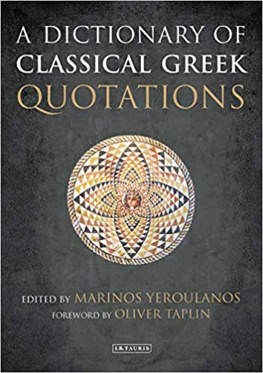


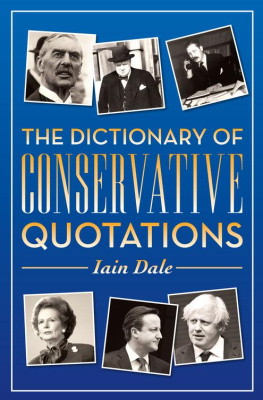
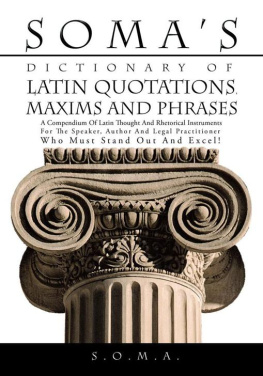

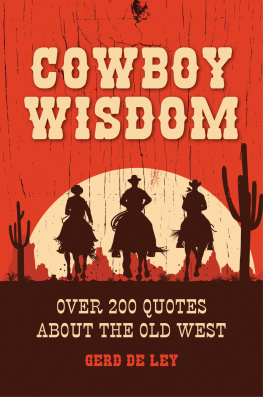
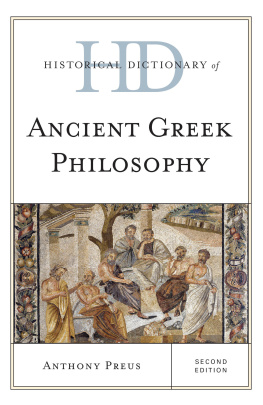
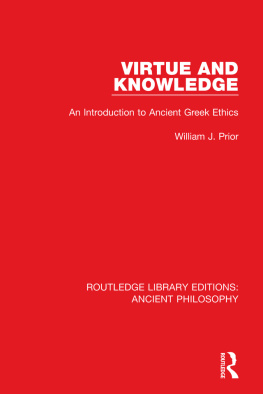
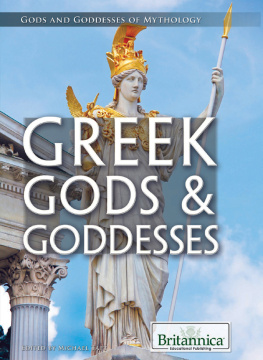


 CONTENTS special categories appendices W hen I was a child there was a copy of the Oxford Dictionary of Quotations on the shelves. I noticed that after the many pages of index in the familiar alphabet, there were two pages more in Greek font. This may even have contributed to my incipient fascination with the familiarity yet strangeness of that rich language. And I began to realize that the Greeks did not only have a word for it, they had a saying for it.
CONTENTS special categories appendices W hen I was a child there was a copy of the Oxford Dictionary of Quotations on the shelves. I noticed that after the many pages of index in the familiar alphabet, there were two pages more in Greek font. This may even have contributed to my incipient fascination with the familiarity yet strangeness of that rich language. And I began to realize that the Greeks did not only have a word for it, they had a saying for it.